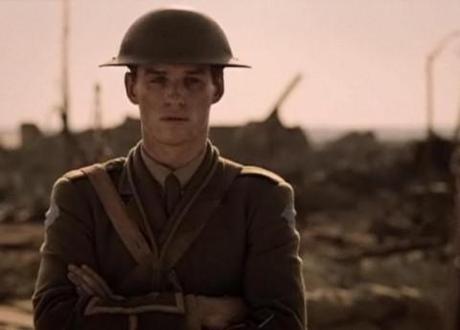
Eddie Redmayne in Birdsong. Photo credit: BBC
The first part of BBC drama Birdsong was a hit with the critics. Andrew Billen described the long-awaited adaptation of the Sebastian Faulks novel as “intensely moreish” in The Times (£), while Serena Davies called the first section “an elegiac, lyrical film” in The Telegraph. Leading man Eddie Redmayne garnered particular attention – in part, it seems, due to his razor-sharp cheekbones.
Part two of Birdsong continued the much-praised flashback structure, moving between Stephen Wraysford’s life in the trenches of World War I and memories of his relationship with married Isabelle (Clémence Poésy). But could the second section live up to the promise of the first?
Heart of drama missing. “Relentless flashbacks drained the dramatic tension,” wrote Sameer Rahim in The Daily Telegraph, describing the overall effect as “slow and congested”. Rahim felt that Birdsong was an empty endeavour: “Some viewers, I know, will have found the director’s aesthetic meditative and haunting. But to me Birdsong seemed like a series of pretty trailers with an empty hole where the drama should have been.”
Too pretty. “Everyone looked strangely unmarked by trench warfare, with the skin of actors Eddie Redmayne and Matthew Goode suspiciously polished in the sun-dappled cloisters,” said Caroline Frost at The Huffington Post, suggesting that the Battle of the Somme looked “more like an ad for a holiday to a Greek island than an exploration of one of the most gruesome chapters in human history”.
Genius. The second part of Birdsong suffered from a “choppier narrative” but was still “touched by genius”, wrote Andrew Billen in The Times (£). Billen again praised Redmayne’s performance: “Above all, Stephen’s emotional progress convinced, not least because Eddie Redmayne made a virtue of Morgan’s lacunae and played on his inarticulacy.” However, Billen did take issue with certain “corny” plot devices and argued that Birdsong’s “motto” that only love makes life worthwhile was misguided: “A worthwhile life might be devoted to building bridges, emptying catheters or, indeed, writing the score for Birdsong,” wrote Billen.
Emotional. “It could so easily have been awful, over-aesthetic and self-conscious. At times it veered in that direction, but then it sucked me in and I no longer cared or noticed, because here was also something intense and moving,” said Sam Wollaston in The Guardian. Wollaston pointed out that Birdsong writer Abi Morgan had cut out the section of Faulks’s novel that deals with Wraysford’s granddaughter, but said that the TV adaption didn’t suffer from the loss.

